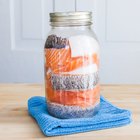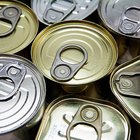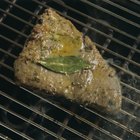bigacis/iStock/GettyImages
Canned foods are seldom exciting, but they're among the longest-lasting of all pantry goods. They're relatively impervious to light and humidity, are sturdy enough to resist physical damage and provide a perfectly airtight seal. That means you have the freedom to stock up on durable goods such as canned salmon whenever an opportunity arises. It will store well for a period of years, providing a convenient source of high-quality protein for quick meals.
Maximum Shelf Life
Theoretically, as long as a can remains intact the food inside should still be edible. In practice, the useful life of canned salmon and similar products is limited by its storage conditions and quality considerations. Salmon can be used for three to five years, as long as the can remains intact and it's been properly stored in a cool, well-ventilated area. Its flavor and quality will deteriorate after extended storage, so it's always a good idea to use your oldest cans first and replace them with new ones.
Limiting Factors
The useful life of canned goods can be shortened by accidental damage or poor storage conditions. For example small dents in cans aren't usually a problem but any deep dent, or a dent along the can's seam, can compromise the airtight seal. Those cans must be discarded. Spots of light rust that can be rubbed off with a finger pose no threat, but any corrosion that pits the metal of the can is a sign that its safety has been compromised. Broad temperature fluctuations or extended storage at temperatures above 85 degrees Fahrenheit can also shorten the useful life of canned foods.
Home-Canned Salmon
Salmon canned at home has its own set of limitations. It must always be processed in a pressure canner to minimize the risk of botulism. Your jars, lids, seals and utensils must be scrupulously sterile, and you must follow the canning instructions rigorously. Your local extension service might provide instructions for quart jars, but some authorities -- such as Canadian canning-goods manufacturer Bernardin -- recommend using nothing larger than a pint jar, for an additional measure of safety. You don't have the resources at home to be as consistently safe as a commercial manufacturer, so it's best to use home-canned salmon within one year.
Danger Signs
Sometimes it's immediately apparent when a can of salmon is damaged and inedible. Deep rust or bad dents can be seen with the naked eye, and swollen cans should be discarded unopened. If the can forcefully sprays juices when you open it it should be discarded, as should any home-canned salmon that's visibly bubbling inside the jar. Spoiled salmon might have "off" flavors or odors after it's opened, though botulism can't be detected this way. Home-canned salmon should be kept at a boil for 10 minutes before it's eaten to minimize the risk.
Keeping Opened Salmon
Once it's been opened, your canned salmon should be treated like any other perishable food. Seal any leftovers in airtight bags or containers and keep it in your refrigerator for up to three days. If you've canned your own salmon, each jar might contain more than you'll eat during that three-day period. If so, package and freeze any excess portions immediately after unsealing the jar.
Related Articles
What Happens if You Eat Expired Beets ...

How to Can Salmon Fish

Can You Freeze Canned Goods?
How Long After the Expiration Date Can ...

Dented Cans and Botulism

How Long Does It Take for Salmon to ...
How Long Can Food Stored in Canning ...

Canned Salmon and Metal Toxins

How Long Can Cooked Salmon Last ...
Do Sardines Ever Go Bad?
Maximum Storage Temperature of Canned ...
How Long Are Canned Meat & Vegetables ...

Can I Cut Freezer-Burn Off a Tuna Steak ...

Problems With Black on Canning Jar Rim

Does Caviar Go Bad?

What Are the Best Containers to Freeze ...

Does Canned Soup Go Bad?

How Long to Cook Canned Salmon in a ...
How Long Can Canned Pickles Stay Good?

Can You Freeze Raw Oysters?
References
Resources
Writer Bio
Fred Decker is a trained chef and prolific freelance writer. In previous careers, he sold insurance and mutual funds, and was a longtime retailer. He was educated at Memorial University of Newfoundland and the Northern Alberta Institute of Technology. His articles have appeared on numerous home and garden sites including GoneOutdoors, TheNest and eHow.